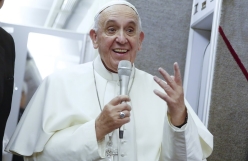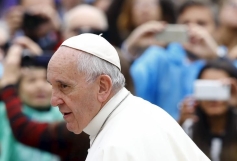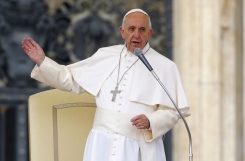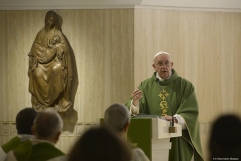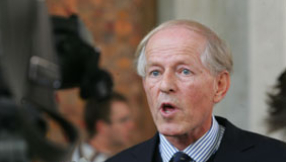Pope Francis said while he wants to help the poor of the world as much as he can, he cannot do so by selling the "riches of the Church."
In an interview by a Dutch newspaper that was published on Friday, the Pope talked about the Vatican's finances, the dangers of corruption, how he personally helps the poor, and even his childhood dreams, the Catholic News Agency (CNA) reported.
The Dutch newspaper "Straatnieuws" is unique since it is published by the homeless of the Dutch city Utrecht. A homeless street newspaper vendor named Marc interviewed the Pope at his Vatican residence on Oct. 27. He was "assisted" by the paper's editor, Frank Dries. Also present during the interview was the former spokesman of the Dutch Bishops' Conference, Jan-Willem Wits.
One of the questions Marc asked was whether the Pope has ever felt pressure to sell "the treasures of the Church." Pope Francis responded, "This is an easy question. They are not the treasures of the Church, [but] the treasures of humanity."
The head of the Roman Catholic Church gave an example: "If tomorrow I say that Michelangelo's Pieta is going to be auctioned, it can't be done, because it's not the property of the Church. It's inside a Church, but it belongs to humanity." He added that this is true "for all the treasures of the Church."
Pope Francis answered tough questions on sensitive issues like whether or not he is worried that his frequent pleas for solidarity in defence of the poor are being exploited by politicians.
The Pope said "two temptations" present themselves when he makes such pleas—hypocrisy and corruption.
"If a believer speaks about poverty or the homeless and leads the life of a pharaoh – this cannot be done," he said. "The Church must speak the truth and also with witness: the witness of poverty."
Also, the Pope said there is always the danger of corruption when agreements are signed between the Vatican and secular foreign governments involving money. He said he is mindful of this and has taken measures to stamp out corruption in the Vatican. "The accounts are all controlled, to avoid corruption, [because] there is always the temptation of corruption in public life – both political and religious."
The Pope said that although he cannot possibly sell the "riches" of the Church, he has sold some personal items, including many of the gifts he has received, to add to the funds allocated for helping the poor. He said among these items are motorcycles and cars given to him as gifts which he said have been sold through auction.
Concerning Church property, including real estate, Pope Francis said the money derived from this is used "to maintain the structures of the Church and to maintain the many works the Church does in needy countries: hospitals, schools."
For instance, the Pope said he recently instructed that 50,000 euros be sent to the Democratic Republic of the Congo to build three schools, because "education is important for children."
As to his personal commitment to help the poor, Pope Francis said many people have inspired him in this regard. One of them, he said, was a poor woman who used to help his mother with household chores when he was still a child.
The woman was Italian, had two children of her own and came to his family's house three days a week to help his mother with laundry and other tasks.
The Pope said the woman and her family were "very poor, but good people. And I always remembered that woman. Her poverty moved me."
After losing contact with the woman for years, the Pope said he found her again when he was archbishop of Buenos Aires. She was already 90 years old at that time. He said he remained close to her over the next three years, until her death at the age of 93.
He said the woman gave him a precious gift before she died—a gift so precious to him that he carries it every day up to now. It was a medal of the Sacred Heart of Jesus, CNA said.
Retrieving the medal from his pocket, the Pope showed it to his interviewers, saying it does him "a lot of good," and that he thinks of the woman every day "and how much she suffered because of poverty. And I think about all the others who have suffered. I carry it and I pray."
Pope Francis said just like any idealist, he would like to see a world where poverty doesn't exist. But he said this is not happening because of the reality of sins, human greed in particular.
He said the lack of solidarity and the egoism of people are the ones that create poverty.
He also revealed that he never dreamt of becoming Pope, and that at 4 years old, all he wanted was to become "a butcher" since he always saw butchers whenever he accompanied his mother and grandmother to the market.










